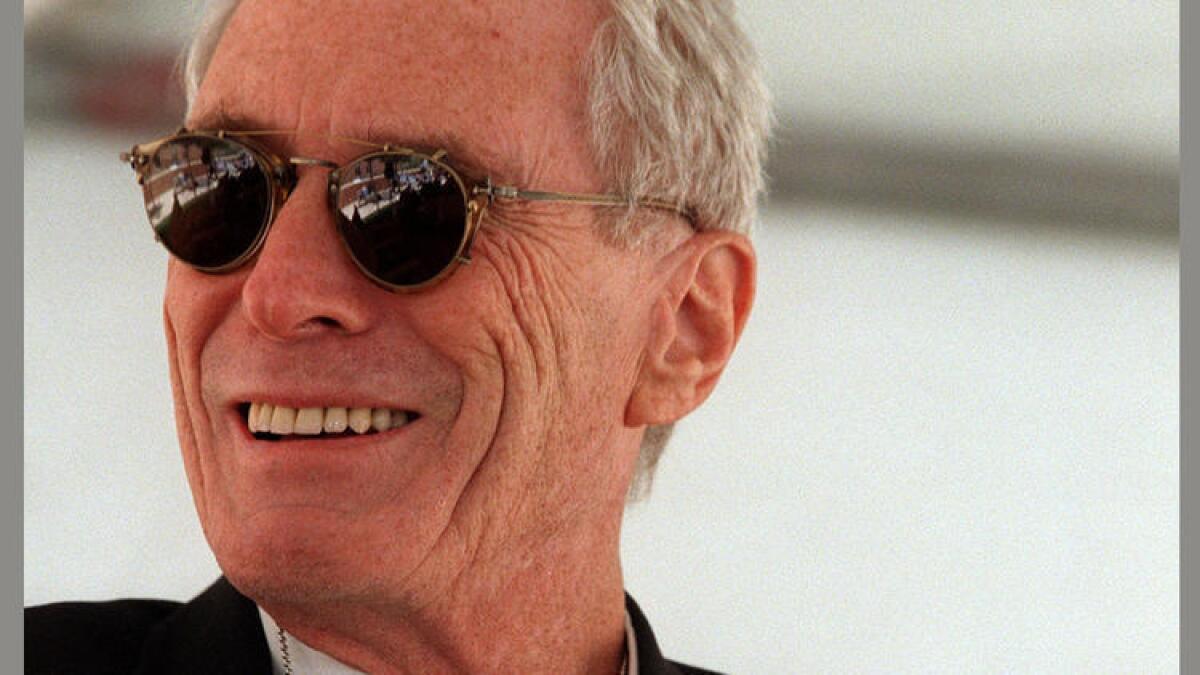Mark Strand, a revelatory poet of love and death

One of the many clichés about poetry is that it is an art with just two subjects: love and death. Mark Strand, who died on Saturday at 80, duly addressed love and death in his poems, but in radically lyrical, revelatory ways.
He was an unconventional poet of love, due to his natural aversion to “earnest” poetry -- by which he meant the self-absorbed enshrinement of the autobiographical. Yet he could write a love poem as eerily sensual as “She”: “Her eyes half-open, she saw the man across the room, / she watched him and could not choose / between sleep and wakefulness. / And he watched her / and the moment became their lives.” A moment of altered mutual perception, as love reinvents time, is as romantic as he would get.
He allowed death freer access. In fact, he welcomed death so readily into his lines that the reaper became a vaguely cheerful figure in the Strandian landscapes. Death rather shyly calls out someone named Strand in 2002’s “Man and Camel”:
I am not thinking of Death, but Death is thinking of me.
He leans back in his chair, rubs his hands, strokes
his beard, and says, “I’m thinking of Strand, I’m thinking
that one of these days I’ll be out back, swinging my scythe
or holding my hourglass up to the moon, and Strand will appear
in a jacket and tie, and together under the boulevards’
leafless trees we’ll stroll into the city of souls.
His early books made their nod to surrealism, but like his close friend, the poet Elizabeth Bishop – surrealism grew out of the music of poetic consciousness itself. In Strand’s case, this meant lyric thought was imagistic, painterly, but also articulated in a voice unlike any other. The monumentality and seeming imperturbability of this singing inner self occasionally gave aspiring poets the impression that Strand was an easy poet to imitate.
The wreckage of these misguided attempts at mimicry can be viewed in and out of writing workshops and derivative chapbooks. How to celebrate originality of this order and intent (“and here the dark infinitive to feel”) and yet neatly articulate its origins? I’m saying that, despite the luminous clarity of his words, there is an intentionally unsolvable mystery in the wilderness of each Strand poem.
In the night without end, in the soaking dark,
I am wearing a white suit that shines
Among the black leaves falling, among
The insect-covered moons of the streetlamps.
I am walking among the emerald trees
In the night without end. I am crossing
The street and disappearing around the corner.
I shine as I go through the park on my way
To the station where others are waiting.
… That, if anyone suffers, wings can be had
For a song or by trading arms, that the rules
On earth still hold for those about to depart.
--“Proem, I” (from “Dark Harbor”)
It may seem contradictory, but beyond the dream-like elegiac treks through his questioning and dark-lit landscapes – Mark Strand remains one of the funniest poets ever. Anarchical wit runs through his entire oeuvre: his fourteen or so collections of poems, a couple prose books, three volumes of translations (including Rafael Alberti and Carlos Drummond de Andrade), three art books, three books for children and his five edited anthologies. (Strand’s “Collected Poems” appeared this year.)
His humor wasn’t exactly deadpan, but it was joyfully low-key lunatic:
It was clear when I left the party
That though I was over eighty I still had
A beautiful body --
And, look, somebody left a mirror leaning against a tree.
Making sure I was alone, I took off my shirt.
-- “Old Man Leaves Party” (from “Blizzard of One”)
And suddenly we heard the explosion.
A man who’d been cramped and bloated for weeks
Blew wide open. His wife, whose back was to him,
Didn’t turn right away to give everything –
a chance to settle.
-- “XXIII, Proem” (from “Dark Harbor”)
I was in the bathtub when Jorge Luis Borges stumbled in the door. “Borges, be careful,” I yelled.“The floor is slippery and you are blind.”
-- “Translation” (from “A Continuous Life”)
Mark Strand’s awards were bountiful and ever-mounting. He won a MacArthur fellowship, the Pulitzer Prize, the Bolligen Prize and the Gold Medal for Poetry from the American Academy of Arts & Letters. He was poet laureate of the United States. He taught at many universities, most recently at Columbia in New York.
For those of us fortunate enough to have counted him as a friend, the cliché of the ongoing reincarnation of the poet through his recorded genius, his published poems and prose, is close to true. He did write for the ages, his work is canonical – his voice unparalleled – and reading and rereading his poems does indeed sustain the reader. Almost. Except in the bleak recognition that Mark Strand the man is gone forever from us. But even in this unthinkable loss, he seemed to have planned ahead, as always, in leaving notes to posterity in his poems.
“No need to rush,” he said at the close of the reading, “the end
Of the world is only the end of the world as you know it.”
How like him, everyone thought. Then he was gone.
And the world was a blank. It was cold and the air was still.
Tell me, you people out there, what is poetry anyway?
Can anyone die without even a little?
-- “The Great Poet Returns” (from “Blizzard of One”)
Muske-Dukes is the author of several books of poems and novels, as well as professor of English/creative writing at USC and founder of the PhD program in literature and creative writing there.
More to Read
Sign up for our Book Club newsletter
Get the latest news, events and more from the Los Angeles Times Book Club, and help us get L.A. reading and talking.
You may occasionally receive promotional content from the Los Angeles Times.






